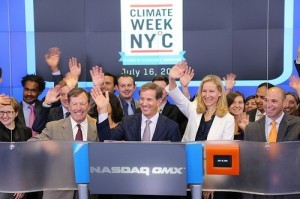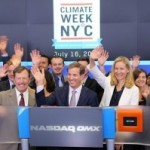
BGen Steve Cheney Interviewed on Climate Change and National Security
One of ASP’s flagship issues is the connection between climate change and national security. Climate

BGen Cheney at NASDAQ Closing Bell Ceremony
change poses serious national security risks – threats to infrastructure, economic well-being, and human populations. As the effects of climate change worsen, these threats will only grow more severe.
ASP’s CEO Brigadier General Stephen Cheney, USMC (Ret.) participated in the kickoff of Climate Week NYC on July 16, 2013 in New York. He rang the closing bell of the NASDAQ stock exchange along with Swiss Re CEO J. Eric Smith. While in New York, Gen. Cheney was interviewed by A.M. Best TV on how specifically climate change creates national security risks around the world.
Gen. Cheney spoke about how in 2010 Russian wildfires decimated wheat crops, which led to a spike in food prices around the world. Higher food prices contributed to the underlying tension that fueled the fire of the Arab Spring.
He also cited the experience in Mali, where drought forced the Tuaregs to migrate. The instability from drought and internal migration created an opening for Al Qaeda in the Islamic Maghreb to overthrow the government.
Finally, Gen. Cheney pointed to one of the more alarming consequences of climate change – the threat to poor coastal nations around the world. In particular, Bangladesh faces a climate crisis worse than most, with millions of people living in an area that is expected to flood from sea level rise in the coming decades. Forced migrations will threaten the security of not only Bangladesh, but a region that includes Pakistan, India, and China.
These climate consequences will inevitably draw in the U.S., and if history is any guide, many incidents may require the U.S. military.
Watch the full interview below:





